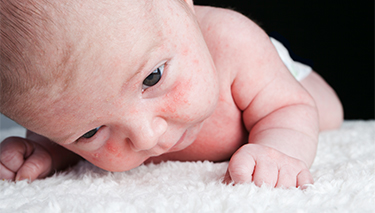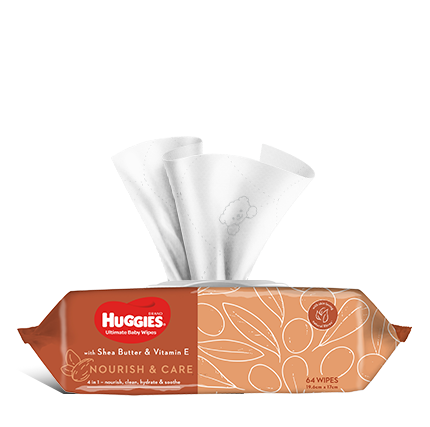Symptoms of dry skin
As well as being dry to the touch, signs of dryness in baby skin can be peeling or flaking of the skin. If your baby seems to be itchy, keep an eye on the areas they are scratching. Sometimes itching can be a sign of eczema.
Early treatment for dry skin helps to prevent complications. Left untreated, dry skin can result in cracking of the epidermis (the outer skin layer) which can be very painful and may lead to infection.
Causes of dry baby skin
Sometimes, babies are born with dry skin. This is most common in babies who are born after 40 weeks gestation. Generally, dry skin improves after birth, especially when the skin is moisturised.
One reason for babies developing dry skin is that they are spending time in air that is either dry, cold, or heated. These conditions remove moisture from the skin. Salt water or chemicals like chlorine or salt used in pools can also be drying.
Many babies also develop dry lips, and in newborns, dry lips are not uncommon. There is no special treatment for dry lips, other than making sure the baby is feeding well and they are not dehydrated. Dry lips can sometimes result from friction caused during feed times.
Another cause for dry skin may be too much bathing. As much as we love bathing our newborns, too much bathing can remove important natural oils from the surface of the skin.
How to treat baby skin dryness
As with most things, prevention is the best cure. Avoid using soap and instead, use a moisturising cleanser or baby wash which is designed for babies. Avoid using powders and strongly perfumed bath washes, and make sure laundry detergents aren t exacerbating any sensitivities.
If dryness has already occurred, then simply try these steps:
- Skip baths every other day. Unless your little one has had a messy day, a daily bath may not be necessary. Instead, just wash their face, hands and nappy area on the days they're not bathed.
- Pay attention to your baby's dry skin on their face and head. Wash your baby's face with plain water and avoid using any cleansers or bath wash which may aggravate their skin. If needed, apply a small amount of baby lotion or moisturiser straight after their bath. Use massage or vegetable oil on your baby's head which will help to relieve dry patches. When your baby's hair needs washing, use a mild baby shampoo or cleanser and rinse well.
- Keep bath times short. Maximise your bath time by having play time before they are submerged in water and then drying your baby right away. Use a soft towel to pat rather than rub their skin dry.
- Apply moisturiser after a bath. As soon as you have towel dried your baby, cover them in a good quality, hypoallergenic, moisturising lotion. Warm this first in your hands which will help the lotion to be absorbed. You may also want to add some baby bath oil or moisturising wash to their bath water, particularly if they have flaky, dry skin. Olive or vegetable oil are good options.
- Make sure your baby has enough to drink. Hydration can be maintained by regular breast or formula feeds. Older babies and toddlers may also need to be offered water in-between their milk and solid feeds.
- Be careful about what you apply to your baby's dry lips. Avoid putting any cream on your baby's dry or chapped lips which is not safe for them to ingest (eat). Rub some breast milk onto their lips, or a small amount of (moisturising) nipple cream to help keep their lips hydrated. Check with a pharmacist first to make sure this is safe to use on your baby.
To learn more about baby skin conditions, take a look at our flaked skin or eczema sections. Have your baby reviewed by a doctor if you are worried or if they have red, itchy or scaly skin patches. Any skin rash also needs to be checked by a doctor.
Edited and reviewed by Jane Barry, Midwife and Child Health Nurse July 2021.


Last Published* May, 2024
*Please note that the published date may not be the same as the date that the content was created and that information above may have changed since.




















